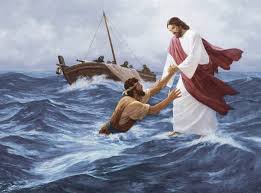HOMILY SUNDAY 19 – A
Faith out of the Ordinary
(1 Kings 19:9a, 11-13a; Psalm 85; Romans 9:1-5; Matthew 14:22-33)
***********************************************************
Moses and Jesus were golfing one day. It turns out that Jesus is a great fan of Tiger Woods. Every time he made a good shot, Jesus would exclaim “Wow – just like Tiger Woods!” and every time he made a poor shot, Jesus would complain, “Oh, if only I could shoot like Tiger Woods.” This went on and on to the point that Moses was getting a bit tired of it all. Then Jesus hit a ball over a pond of water into the rough. Moses asked him if he should part the waters for him to get his ball. Jesus replied no, he would walk over and get it himself, and proceeded to walk on the water towards his ball. Another golfer came along, noticed Jesus walking on the water and asked Moses, “Who does that guy think he is, Jesus Christ?” Moses replied, “No, Tiger Woods!”
Silence is the language that God speaks best.
The readings today invite us, at the height of summer, to deepen our prayer life.
Many years ago, Queen’s House of retreats and renewal in Saskatoon began to offer a series of retreats called “Summer Stillness.” The beauty of this idea was to invite people to come closer to God by entering into moments of quiet prayer and reflection under the guidance of well-known presenters. Those sessions continue to this day.
One of the strongest reasons we have to pray is that Jesus went by himself to pray. He modeled prayer as communion with God. There is a strong message here for us to do the same, if we are to follow him.
The first reading touches on a spiritual reality that might be helpful for the ordinary person to know in terms of prayer, and that is the spiritual reality of consolation and desolation. Elijah is discouraged that his work for God was not accepted, so discouraged that he does not want to continue going on living. Some would say that he was depressed. May I suggest that he was not depressed but rather in a state of desolation? What is the difference?
Depression is an all too common part of our modern life. Henri Thoreau, I believe, is the one who claimed that most people lead lives of quiet desperation. Depression can be defined as anger turned inwards. It is a psychological state of one’s being that may be caused by chemical imbalance, stressful situations, loss or a pervasive melancholy temperament.
Desolation is not depression. It is an experience of the apparent absence of God. At times, God seems to pull away from us, to leave us feeling abandoned, lonely, restless and empty, like in a void. God does this to strengthen our faith, to help us sink deeper roots of love that are based on faith and not on pleasant emotions. God wants us to be in love with God, and not with the experience of being in love with God. Though in times of desolation it may feel like God is a million miles away, we may be closer than ever to God.
The opposite of desolation is consolation. Those are those moments of sheer delight in God’s presence, of wellbeing, of closeness to God, of inspiration and insight. They tend to be rare, and to seek after them is a mistake that many make. Actually, the desire for only pleasurable feelings can be at the root of addictive behavior, which tries to medicate any pain. A person who is mature in prayer will be open to consolation while trusting in God during times of desolation.
That being said, the readings today offer us many lessons on prayer and the many types of prayer. One important method of prayer is called the prayer of the Anawim. The anawim are the poor humble people in the bible who know they need God, people like Joachim and Anne, the grandparents of Jesus, and Zechariah and Elizabeth, who though old had no children.
 St. Peter, in the gospel, is a vivid example of someone who makes the transition from proud prayer to the prayer of the anawim. When he sees Jesus walking on the water, he calls out to Jesus and tells Jesus what to do: “Lord, make me come to you on the water.” Jesus humors Peter and invites him to come. Peter has faith, steps out of the boat and actually walks on the water. However, Peter’s faith is proud and insufficient – he takes his eyes off Jesus, looks back at the boat to see if his friends are watching him, feels the wind, starts to sink and panics. Now his prayer is different – it comes from his gut and out of his need – just three words: “Lord, save me” and Jesus is there, picking him up and gently chiding him for his lack of faith. I am convinced that Peter did not let go of Jesus, but rather walked back to the boat hanging on to Jesus. And that is an image of the prayer of the anawim – those who admit their need and walk with Jesus every day, one day at a time.
St. Peter, in the gospel, is a vivid example of someone who makes the transition from proud prayer to the prayer of the anawim. When he sees Jesus walking on the water, he calls out to Jesus and tells Jesus what to do: “Lord, make me come to you on the water.” Jesus humors Peter and invites him to come. Peter has faith, steps out of the boat and actually walks on the water. However, Peter’s faith is proud and insufficient – he takes his eyes off Jesus, looks back at the boat to see if his friends are watching him, feels the wind, starts to sink and panics. Now his prayer is different – it comes from his gut and out of his need – just three words: “Lord, save me” and Jesus is there, picking him up and gently chiding him for his lack of faith. I am convinced that Peter did not let go of Jesus, but rather walked back to the boat hanging on to Jesus. And that is an image of the prayer of the anawim – those who admit their need and walk with Jesus every day, one day at a time.
Step 11 of the program of Alcoholics Anonymous is a good example of this kind of prayer: “Sought through prayer and meditation to improve my conscious contact with God, seeking only the knowledge of God’s will for us and the power to carry it out.” Now that is a mature view of prayer.

Elijah in his cave
Elijah in the first reading takes us deeper into the prayer of contemplation. Elijah finds God not in the fierce wind nor in the tempest but as it is sometimes beautifully translated, in the “sheer silence.” Too often we are tempted to think that our prayer needs to be loud and wordy, whereas here we are taught just the opposite – to find God in the prayer of contemplation. Contemplation is prayer of deep faith. The prayer of contemplation places us in God’s presence as a listener, trusting that in the silence, God is doing what God wants to do, transforming us into God’s likeness. We try not to think or even to feel anything, and if a thought or feeling comes, we acknowledge it, thank God for that thought or feeling, then let it go. If we can let these good things go in prayer, we will be more able to let go of negative things in life after our prayer.
Mature prayer always demands strong faith. An all too common view is that if we have faith, our problems will be solved in spectacular ways, like Peter walking on the water. A more mature view of prayer is that if we have faith, we will find God in our struggle with our issues. Within this view, if Peter had deeper faith, he would have stayed in the boat and not tested Jesus.
A last way of praying offered to us by the gospel is worship. The disciples in the boat worshipped Jesus. This is the first incident in the gospels where they do so. They model what we are doing right now – gathered to worship our God. It is impossible to underline the importance of Sunday celebrations enough.
The Eucharist is our best way of worshipping Jesus – of being in the boat with him like the disciples – our highest prayer. It is here that we blend prayer as petition, praise, silent adoration and thanksgiving. The word Eucharist itself means to give thanks.
So this summer, let our prayer reflect our faith – let us pray the prayer of the anawim, the prayer of contemplation, and worship the Lord through the Eucharist as a community.



